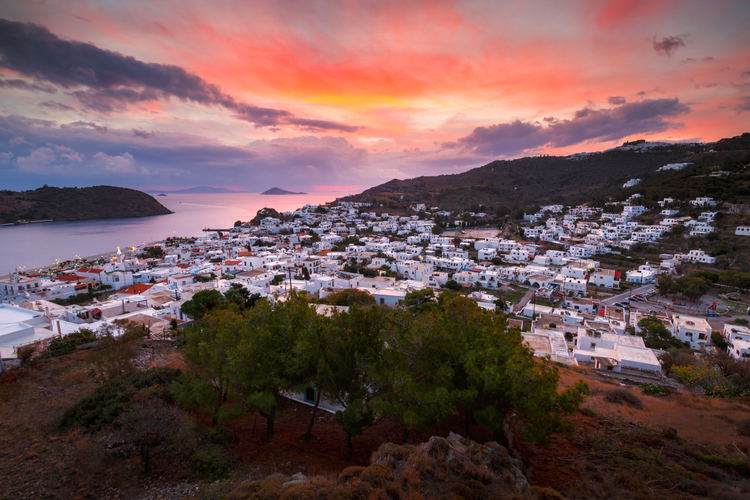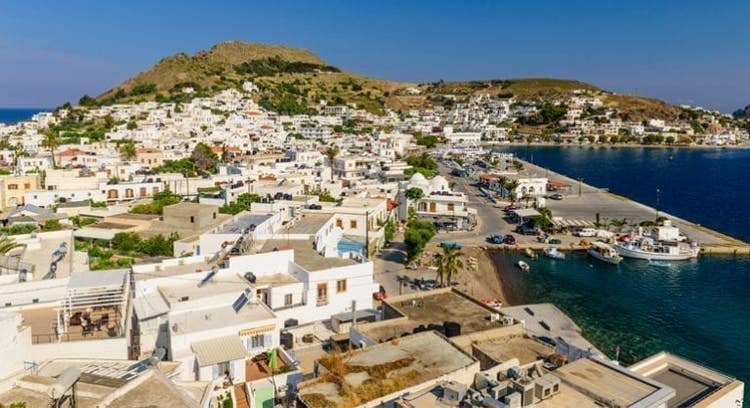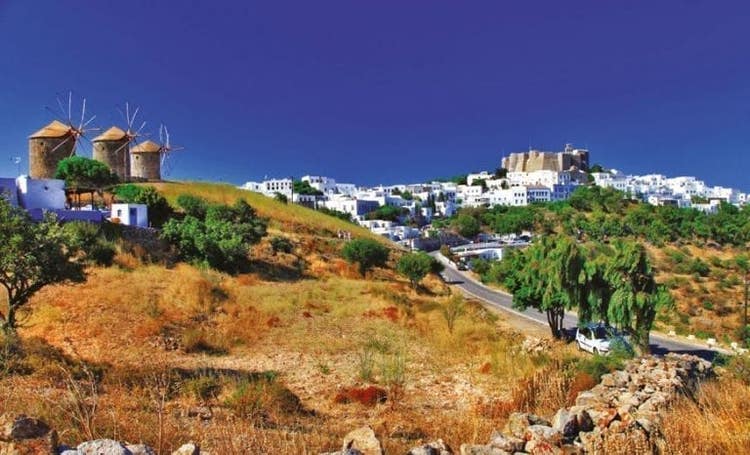
Hillside coastal town with white buildings overlooking the sea at sunset, featuring vibrant skies and scenic natural surroundings.
The Simply Divine Island of Patmos
Cruises to Patmos
Highlights

Coastal town with white buildings and a vibrant harbor, nestled against a hilly landscape with clear blue seaside waters.
Skala
Patmos is situated in the northwestern part of the Dodecanese archipelago, 163 nautical miles from Piraeus. Its 63 kilometers of coastline form a scenic ribbon of beaches, bays large and small and hidden coves, encircling a gorgeous landscape by turns volcanic and rocky, with rugged peaks rising over hidden green valleys. Skala, the island’s main harbor and commercial center, is where you’ll get the first taste of Patmos’s easy charm, with its winding whitewashed alleyways, upscale boutiques and cafes set close to the sea. It’s also the center of the island’s cosmopolitan nightlife (but think cafes and bars more than Mykonos-style clubs!). Be on the lookout for “insider” tavernas like Trehantiri where fresh-caught fish and hand-cut French fries rule the day.

Scenic hilltop town with white buildings, historic windmills, and a distant fortress, set against a clear blue sky and rugged natural terrain.
Chora
But the most iconic town on Patmos is certainly Chora, which together with the Monastery of St. John the Theologian and the Cave of the Apocalypse is a UNESCO World Heritage Site. There are art galleries and cafes galore, but the monastic complex is the defining feature of Chora and sits on its highest point—truly stunning in its sturdiness, it’s nothing less than a monumental lookout post for Christendom. The Byzantine monastery itself was built in 1088 by St. Christodoulos and features extremely high stone ramparts over which boiling oil could be poured on pirates and invaders. Its crenellations and towers give the monastic complex the appearance of a polygonal castle from the outside, while inside the monastery walls are a cathedral and eight chapels. The island’s trademark trio of stone windmills stands guard nearby the walls.

Entrance of a white stucco building with a wooden door, stone arch, religious fresco, and traditional architectural details.
Cave of the Apocalypse
The spiritual heart of Chora and indeed of Patmos is the Cave of the Apocalypse where tradition holds that John the Apostle and Evangelist (St. John the Divine), having been expelled from Ephesus in present-day Turkey in 95 AD, dictated the Book of Revelation and his Gospel to Prochoros, his disciple. The small cave is located inside an unassuming ensemble of churches, chapels and monastic cells about midway along the steep winding road between Chora and Skala. Behind a simple white facade and green door, above which is a mosaic depicting John with his disciple transcribing the Apostle’s visions into writing, is the actual cave. The quiet space is replete with Byzantine icons and religious relics and if you look carefully you can see three fissures in the rock that are said to represent the Holy Trinity of God. This sacred site more than any other on Patmos gives the island enduring importance for Christian pilgrimage.

Shallow coastal waters with a rocky bottom leading to a beach with umbrellas, backed by green hills and scattered houses under a bright blue sky.
Agriolivado beach
If faith has shaped the island’s history and unique place in the Greek archipelago, the blue sea is also what makes it splendid. So, if you have time, try to fit in a swim at one of the island’s numerous excellent beaches. One of the most iconic is south of Chora at the charming village of Grikos—look for the big rock called Petra to the right of the beach. For a memorable gourmet dinner here, try the restaurant Apocalypsis, where cod fritters with cream potatoes and garlic confit tempt as much as the seaside setting. Agriolivado, three kilometers north of Skala, is a fine family-friendly beach with sun loungers and umbrellas. In the north at Geranou, right on the Patmos seahorse’s snout, there’s a beautiful sandy beach framed by crystal-clear waters: like most everywhere else on this exceptional island, it’s simply divine!